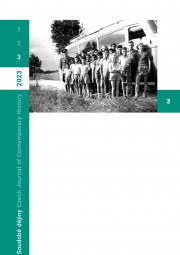The "Bad" Slovak Martin M. Šimečka
The "Bad" Slovak Martin M. Šimečka
The Critical Engagement of a Liberal Writer and Journalist with Slovak Nationalism and the State of Democracy in the 1990s
Author(s): Dirk Mathias DalbergSubject(s): History, Civil Society, History of ideas, Political history, Transformation Period (1990 - 2010), Post-Communist Transformation
Published by: AV ČR - Akademie věd České republiky - Ústav pro soudobé dějiny
Keywords: Slovakia;Czechoslovakia;dissent;Martin Milan Šimečka;post-communism;post-communist transformation;nationalism; liberalism;Slovak politics;Vladimír Mečiar;“Mečiarism”
Summary/Abstract: After Slovakia’s independence in 1993 and especially after the parliamentary elections in 1994, which resulted in Vladimír Mečiar’s third term as Slovak Prime Minister, the hitherto successful processes of political and democratic transformation in Slovakia came to a halt until the subsequent elections in 1998, which ended Mečiar’s rule. Under Mečiar, whose style of government was labelled “Mečiarism”, Slovaks who were sceptical about Slovak national independence and of Mečiar himself as Prime Minister, were labelled “bad” Slovaks, while the Prime Minister’s supporters, on the other hand, were portrayed as “good” Slovaks. One of the “bad” Slovaks was (Czech) writer and journalist Martin M. Šimečka (born in 1957 in Bratislava), son of former dissident Milan Šimečka (1930–1990). In this article, the author analyses his texts from the years 1991–1998, which reflected the turbulent developments in Slovakia at the time, and examines how Šimečka critically commented on its defining political phenomena: the division of the Czechoslovak federation and the establishment of the independent Slovak Republic, the rise of nationalism fuelled by the new political representation, and the growing autocratic tendencies during the second and third Mečiar governments (1992–1998), which threatened the very democratic direction of an independent Slovakia and its anchoring in Euro-Atlantic structures. He argues that Šimečka’s political thought grew out of his family’s dissident roots and that he transferred the free-thinking, tolerant ethos of Czechoslovak dissent to the vastly changed conditions of Mečiar’s Slovakia. He points out the importance of Šimečka’s bilingual Czech-Slovak identity for his thinking and position in the public arena in the 1990s and infers that Martin M. Šimečka was (and remains still) one of the most prominent public intellectuals in Slovakia, who, through his publications and other activities since the 1990s, has consistently contributed to the formation and maintenance of a democratic, liberal, pluralistic and pro-Western current of thought in opposition to the unifying pressure of the power establishment and the media under its influence. According to the author, Šimečka can be considered one of the representative personalities in this respect.
Journal: Soudobé Dějiny
- Issue Year: XXX/2023
- Issue No: 3
- Page Range: 818-849
- Page Count: 32
- Language: English

